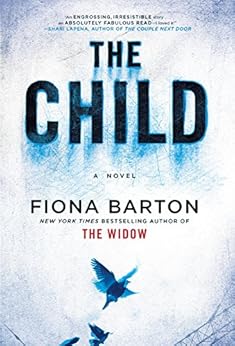 The novel
focuses on the reactions of four women to the discovery of a long-buried infant’s
skeleton on a building site. Kate Waters,
a reporter, decides to investigate this case in the belief that there is a
human interest story to be written. Emma
Simmonds, who once lived in the area where the body was found, becomes panicked
when she reads about the finding of human remains. Jude Massingham, Emma’s narcissistic mother
who forced her daughter to leave home at 16, also becomes anxious at the news. Angela Irving, whose newborn daughter Alice
was kidnapped from the hospital, is convinced the bones belong to Alice. As Kate delves, more and more secrets are
uncovered and the lives of the four women become entwined.
The novel
focuses on the reactions of four women to the discovery of a long-buried infant’s
skeleton on a building site. Kate Waters,
a reporter, decides to investigate this case in the belief that there is a
human interest story to be written. Emma
Simmonds, who once lived in the area where the body was found, becomes panicked
when she reads about the finding of human remains. Jude Massingham, Emma’s narcissistic mother
who forced her daughter to leave home at 16, also becomes anxious at the news. Angela Irving, whose newborn daughter Alice
was kidnapped from the hospital, is convinced the bones belong to Alice. As Kate delves, more and more secrets are
uncovered and the lives of the four women become entwined.
The book is
an easy, quick read. The division into
short chapters (alternating with the viewpoints of the various women) quickens
the pace. The reader does not have to do
a great deal of thinking to guess what is supposed to be the big plot twist at
the end. To the author’s credit, there
are a great number of clues to steer the reader in the right direction. I found, therefore, that there really wasn’t
a great deal of suspense; I read just to find out if I had correctly guessed
the ending. Readers will probably find
the conclusion emotionally satisfying, but I found it rather melodramatic.
The book
examines how tragedies in the past affect the emotional lives of people in the
present. Obviously, the loss of Alice
has devastated Angela and affected her relationships with her husband and other
children. When tragedies are kept
secret, there are also consequences. Emma,
for example, has a secret she has shared with no one, not even her husband, and
her relationships with him and her mother are affected.
I did not
always find Kate a believable character.
For instance, people’s willingness to speak to Kate, I found
problematic. People are usually reticent
to speak to journalists but she manages to get everyone to talk to her. Even the police co-operate with her. Sometimes she just seems too much like a
know-it-all. At one point, a detective
asks Kate, “’Any news on forensics?’” and she replies, “’Nothing yet. What we need is to get the Met to look at
Angela’s DNA. I was going to call the
detective in the building-site-baby case to suggest it . . . ‘” She has to tell the police how to do their
job? When Angela awaits DNA test
results, she asks Kate, “’You will ring as soon as you hear, won’t you? Promise me.’”
A reporter would know such test results before the person whose sample
was taken?
Like Burton’s
first novel, The Widow, this one makes
for a good summer read. It is
undemanding and sufficiently interesting to while away a few leisurely
hours.
No comments:
Post a Comment